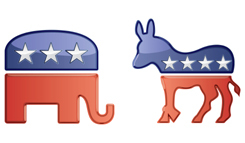
Omnibus, in political speech, simply means legislation with many laws and/or amendments all being voted on at once. Yes or No. All or Nothing.
In order for the US Government to spend money, Congress is required to write a bill appropriating the money - see Article I, Section 9 of the United States Constitution. The President must then sign the bill into law.
Each year there is an appropriations process to fund the federal government for the coming fiscal year, and then often a large omnibus bill is passed to fund the various government agencies that were not included in the regular appropriations process, for whatever reason (often political reasons). An Omnibus bill is also an oft used vehicle for Congressmen to add special earmarks for their own districts.
Breaking News About the 2009 Omnibus Bill:
3/11/2009 Presented to President Obama - The President signs the bill saying "I am signing an imperfect omnibus bill because it's necessary for the ongoing functions of government"
3/10/2009 Passed/agreed to in Senate: Passed Senate without amendment by Voice Vote - Cleared for White House
3/5/2009 Senate Majority Leader Harry Reid said tonight that he was one vote short of the votes needed for cloture. Therefore, the cloture motion on the bill was withdrawn by unanimous consent in Senate. Note: Cloture is used to stop an opposing filibuster. It takes 60 votes to shut off debate and move to final passage.
2/25/2009 The Bill is Passed/agreed to in the House: On passage Passed by the Yeas and Nays: 245 - 178 (Roll no. 86).
2/23/2009 The 2009 Omnibus bill is introduced in House by Dave Obey (D-WI), Chairman of the House Appropriations Committee.
What is the Omnibus Appropriations Act of 2009?
2009 Omnibus Appropriations Act totals about $410 billion and covers funding for fiscal year 2009 for the nine federal agencies that were not funded under the regular appropriations process last year.

Last year, Congress approved fiscal year 2009 appropriations for Defense, Veterans Administration, Military Construction, and Homeland Security. Appropriations for debt interest and for entitlements like Social Security and Medicare as well as interest on the debt are essentially on auto-pilot and are not subject to annual debate.
However, Congress did not approve final appropriations for the other departments. These departments are currently being funded through a continuing resolution based on fiscal year 2008 appropriations. The Omnibus bill will authorize the final 2009 appropriations for these departments: Agriculture, Commerce/State/Justice, Energy and Water, Financial Services, Interior, Labor/Health and Human Services, Transportation/HUD, State/Foreign Operations and Legislative Branch.
The Debate
The debate is basically over the large size of the bill and the extreme number of earmarks.
The people on the pro-2009-omnibus-bill side of the debate argue that the problems we face are large and the large spending bill addresses the size of the problem.
Dave Obey (D-WI), Chairman of the House Appropriations Committee said "Now, the critics say a number of things. They say the bill is too big. And then they announce they are going to produce a recommit motion which adds $9 billion to the costs. That's what I call falling off both sides of the horse at the same time. I would suggest that this bill is big all right. But I'll make you a deal. You show me a smaller problem that we have to confront and I will be happy to produce a smaller bill."

The anti-2009-omnibus-bill side of the debate argues that the 8.3% spending increase over 2008 levels radically increases the size of the federal government especially considering the 2009 Stimulus Package.
Congressman Jason Chaffetz (R-UT) said "However, the situation is even worse when the Omnibus bill is considered along with the recently passed "stimulus" bill. The "stimulus" bill added $269.7 billion to 2009 appropriations for these departments. When the impacts of the Omnibus and the "stimulus" bill are combined, fiscal year 2009 appropriations for these departments will increase a massive 79.6%."
Related Articles
- What Are Earmarks?
- Obama Mortgage Rescue Plan FAQ
- Obama's Loan Modification Plan Explained
- Stimulus Plan 2009-What's In it For You
- 2009 Economic Stimulus Package Explained
- What is a Reverse Mortgage?
- Loan Modification: Is it Right for You?
- Obama Stimulus Plan FAQ
- 2009 Economic Stimulus Plans-A Glossary of Terms
- Executive Summary of the 2009 Economic Stimulus Plan
- 5 Tips For Improving Your Credit Score
- Do You Qualify for an FHA Loan?
 Print
Print Email
Email







